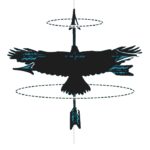which is funny because you are a million percent sure you’ve never been perceived this way before. You’ve been told you are friendly and have a kind smile. You are small, have been thin all your life, too underweight to donate blood. Instead, you’ve given other things: box wine for the house, 20 dollar donations to struggling families’ GoFundMes, a pressed-lip-this-fucking-sucks look to friends who need it. There is risk in putting on a jacket and running shoes, but you know how much worse things will be if you stay inside all day, tracking the movement of the sun through the window. You head out to the trail near your house because it’s bright and clear. The other week, it was an old white man at the grocery store. You stood in front of the meat substitute section, which looked as ravaged as a carcass left for the vultures. While you contemplated the morality of taking more than three packages of fake ground beef, he stepped in front of you, reaching for the fridge handle before asking if he could. “Leave some for the rest of us,” he said, and the word “us” had the effect of a strong wind, of the newsworthy earthquake back home that nearly knocked you off your feet. You quickly learn traffic rules apply to walks: keep to the right side of the road, the first person who arrives at an intersection goes first. For the most part, people are courteous. Still, you are unaccustomed to them crossing the street when they see you. Yesterday, you made a left turn, cutting off an older white woman. She screamed something at you that you couldn’t hear because you had earphones in, which you counted as luck. Someone said something about sticks and stones, which you know isn’t true because words do more damage. In a news conference, early in quarantine, a single word was crossed out and replaced by another, and you’ve logged the ripples in the archive of your existence: tweets about the consequences of eating snakes and bats by people who probably proudly eat meat, anecdotes about Americans spat at by truck-driving cowards, the steep decline of Asian takeout, the family stabbed in Texas by a self-proclaimed vigilante. You don’t consider yourself Chinese, but you have Chinese blood, which helped your mother escape Vietnam. Money helped, but words on paper decided where you would be born. So you greet people first, enunciate hello or good morning, as if clamoring to scare off bears. You smile and wave at a young family on the trail, though the parents keep their eyes to the ground as if they don’t notice. But the baby in the father’s Bjorn smiles back, revealing only gums, waving a pink palm.
—
Originally from Orange County, California, Nancy Nguyen resides in Baltimore, Maryland. Last summer, she was a 2019 Aspen Words Emerging Writing Fellow. A selection of her work has been published or is forthcoming in NANO Fiction, Paper Darts, and Jellyfish Review. She is working on her first collection and novel, both about women who toil on unforgiving terrain, where capitalism is at odds with the currency of family bond.
 Artwork by: Robert Anasch
Artwork by: Robert Anasch

This shortcode LP Profile only use on the page
Profile Artwork by: Robert Anasch
Artwork by: Robert Anasch
